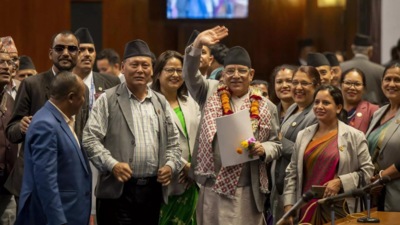- News
- World News
- Rest of World News
- Amid opposition protests, Nepal PM wins parliamentary vote of confidence
Trending
Amid opposition protests, Nepal PM wins parliamentary vote of confidence
Nepal's prime minister won a parliamentary vote of confidence on Monday. The opposition protested, demanding a parliamentary probe into allegations that his home minister illegally took money from several companies before entering politics. Pushpa Kamal Dahal, who was a former Maoist rebel chief in the Himalayan nation located between China and India.

PTI photo
KATHMANDU: Nepal's prime minister won a parliamentary vote of confidence on Monday amid protests by the opposition demanding a parliamentary probe into allegations that his home minister illegally took money from several companies before he entered politics.
Pushpa Kamal Dahal, a former Maoist rebel chief in the Himalayan nation sandwiched between China and India, formed a coalition cabinet in March with the support of the liberal Communist Unified Marxist-Leninist (UML) party and several smaller parties.
A fresh vote of confidence became necessary after a junior partner in the coalition withdrew support following differences with the leader.
The main opposition Nepali Congress said Dahal must set up a parliamentary panel to probe allegations that Deputy Prime Minister in charge of the home ministry, Rabi Lamichhane, illegally took large amounts of money from a number of cooperative companies, which are formed and run by small group of people, when he was a television show presenter before joining politics.
Parliament Speaker Dev Raj Ghimire said Dahal won 157 votes, exceeding the minimum 138 required, in the 275-member parliament in Monday’s voting in which the entire opposition - except one member - did not participate.
“As the number is the majority of all members of parliament, I declare the motion of confidence tabled by the prime minister as passed,” Ghimire told the parliament as the opposition Nepali Congress party protested and shouted slogans.
Dahal, who still goes by his war nom de guerre "Prachanda", which means fierce, led a decade-long insurgency from 1996 which caused 17,000 deaths before he joined mainstream politics under a 2006 peace deal overseen by the United Nations.
He is serving a third time as prime minister, although he did not complete the full five-year term during previous stints.
Pushpa Kamal Dahal, a former Maoist rebel chief in the Himalayan nation sandwiched between China and India, formed a coalition cabinet in March with the support of the liberal Communist Unified Marxist-Leninist (UML) party and several smaller parties.
A fresh vote of confidence became necessary after a junior partner in the coalition withdrew support following differences with the leader.
The main opposition Nepali Congress said Dahal must set up a parliamentary panel to probe allegations that Deputy Prime Minister in charge of the home ministry, Rabi Lamichhane, illegally took large amounts of money from a number of cooperative companies, which are formed and run by small group of people, when he was a television show presenter before joining politics.
Lamichhane has denied the charges.
Parliament Speaker Dev Raj Ghimire said Dahal won 157 votes, exceeding the minimum 138 required, in the 275-member parliament in Monday’s voting in which the entire opposition - except one member - did not participate.
“As the number is the majority of all members of parliament, I declare the motion of confidence tabled by the prime minister as passed,” Ghimire told the parliament as the opposition Nepali Congress party protested and shouted slogans.
Dahal, who still goes by his war nom de guerre "Prachanda", which means fierce, led a decade-long insurgency from 1996 which caused 17,000 deaths before he joined mainstream politics under a 2006 peace deal overseen by the United Nations.
He is serving a third time as prime minister, although he did not complete the full five-year term during previous stints.
End of Article
FOLLOW US ON SOCIAL MEDIA










